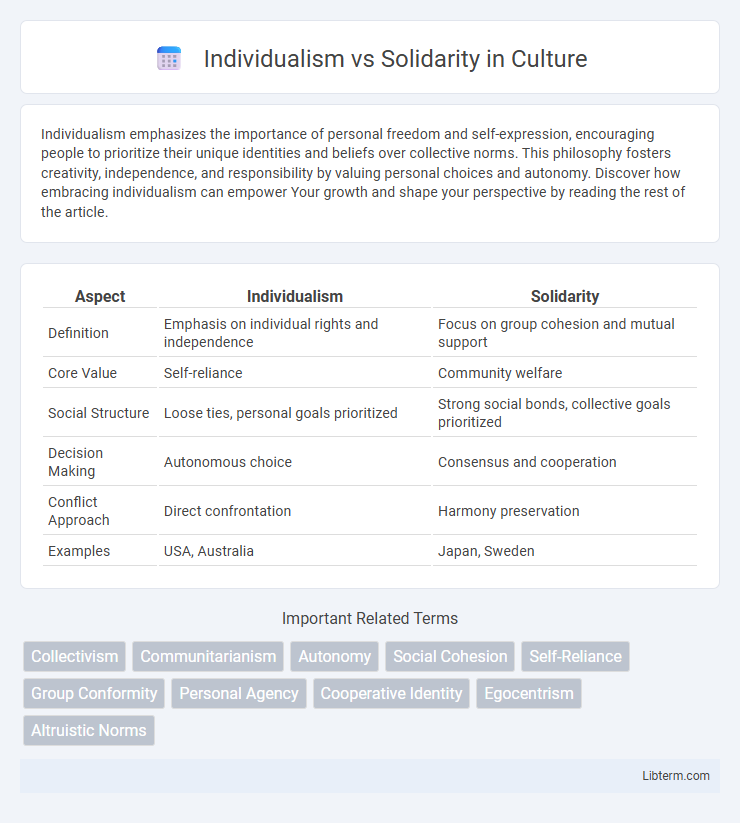Individualism emphasizes the importance of personal freedom and self-expression, encouraging people to prioritize their unique identities and beliefs over collective norms. This philosophy fosters creativity, independence, and responsibility by valuing personal choices and autonomy. Discover how embracing individualism can empower Your growth and shape your perspective by reading the rest of the article.
Table of Comparison
| Aspect | Individualism | Solidarity |
|---|---|---|
| Definition | Emphasis on individual rights and independence | Focus on group cohesion and mutual support |
| Core Value | Self-reliance | Community welfare |
| Social Structure | Loose ties, personal goals prioritized | Strong social bonds, collective goals prioritized |
| Decision Making | Autonomous choice | Consensus and cooperation |
| Conflict Approach | Direct confrontation | Harmony preservation |
| Examples | USA, Australia | Japan, Sweden |
Understanding Individualism: Core Principles
Individualism emphasizes personal autonomy, self-reliance, and the pursuit of individual goals, valuing personal freedom over collective control. Core principles include the belief in inherent individual rights, the importance of personal responsibility, and the prioritization of individual interests in decision-making. This philosophy fosters innovation and self-expression by encouraging individuals to act independently and develop their unique identities.
The Essence of Solidarity: Building Collective Strength
The essence of solidarity lies in uniting diverse individuals to create collective strength that transcends individual capabilities. Solidarity fosters cooperation, shared goals, and mutual support, enabling communities to address common challenges effectively. Emphasizing collective action over isolated efforts maximizes social impact and resilience.
Historical Perspectives: Evolution of Individualism and Solidarity
The evolution of individualism and solidarity traces back to ancient philosophical roots, where Greek and Roman thinkers emphasized personal virtue alongside civic duty. During the Enlightenment, individualism gained prominence through thinkers like John Locke, advocating for personal rights and autonomy, contrasting with earlier communal frameworks. Industrialization further transformed these concepts, highlighting tensions between individual freedoms and collective welfare, shaping modern social and political ideologies.
Sociocultural Influences on Individual and Collective Values
Sociocultural influences shape individualism and solidarity by embedding values through family, education, and media, which prioritize either personal autonomy or group cohesion. Cultural contexts with strong communal ties emphasize collective responsibility and social support, reinforcing solidarity as a core value. In contrast, societies valuing independence promote self-expression and individual achievement, driving individualistic behaviors and beliefs.
Individualism in Modern Society: Benefits and Challenges
Individualism in modern society promotes personal autonomy, creativity, and self-expression, driving innovation and diverse cultural development. It empowers individuals to pursue unique goals, but can also lead to social isolation and weakened communal bonds. Balancing individual rights with collective responsibility remains a critical challenge in sustaining social cohesion.
Solidarity Movements: Past and Present Impact
Solidarity movements such as the Polish Solidarity trade union in the 1980s have historically challenged authoritarian regimes and inspired global democratic reforms. Contemporary movements like Black Lives Matter use digital platforms to mobilize mass support and influence policy changes worldwide. These solidarity efforts demonstrate the enduring power of collective action in advancing social justice and human rights.
Balancing Personal Freedom with Social Responsibility
Balancing personal freedom with social responsibility involves recognizing individual rights while fostering a commitment to the collective well-being. Emphasizing individualism encourages self-expression and autonomy, whereas solidarity underscores cooperation and mutual support essential for social cohesion. Achieving equilibrium requires policies that protect personal liberties without compromising community welfare and shared ethical obligations.
The Role of Individualism and Solidarity in Economic Systems
Individualism drives innovation and entrepreneurial spirit by prioritizing personal goals and competition within economic systems. Solidarity emphasizes cooperation and shared resources, fostering social safety nets and equitable wealth distribution. Balancing individualism and solidarity shapes economic policies that promote both efficiency and social welfare.
Navigating Conflicts Between Individual Rights and Collective Good
Balancing individual rights with the collective good requires understanding the core values of both individualism and solidarity. Protecting personal freedoms while promoting social cohesion involves addressing conflicts through inclusive dialogue and equitable policies. Effective navigation of these tensions fosters respect for diversity alongside shared responsibility in society.
Towards a Harmonious Future: Integrating Individualism and Solidarity
Integrating individualism and solidarity fosters a harmonious future by balancing personal autonomy with collective responsibility. Emphasizing mutual respect and cooperation enables societies to leverage individual creativity while addressing shared challenges. This synergy enhances social cohesion and drives sustainable development through inclusive participation.
Individualism Infographic

 libterm.com
libterm.com